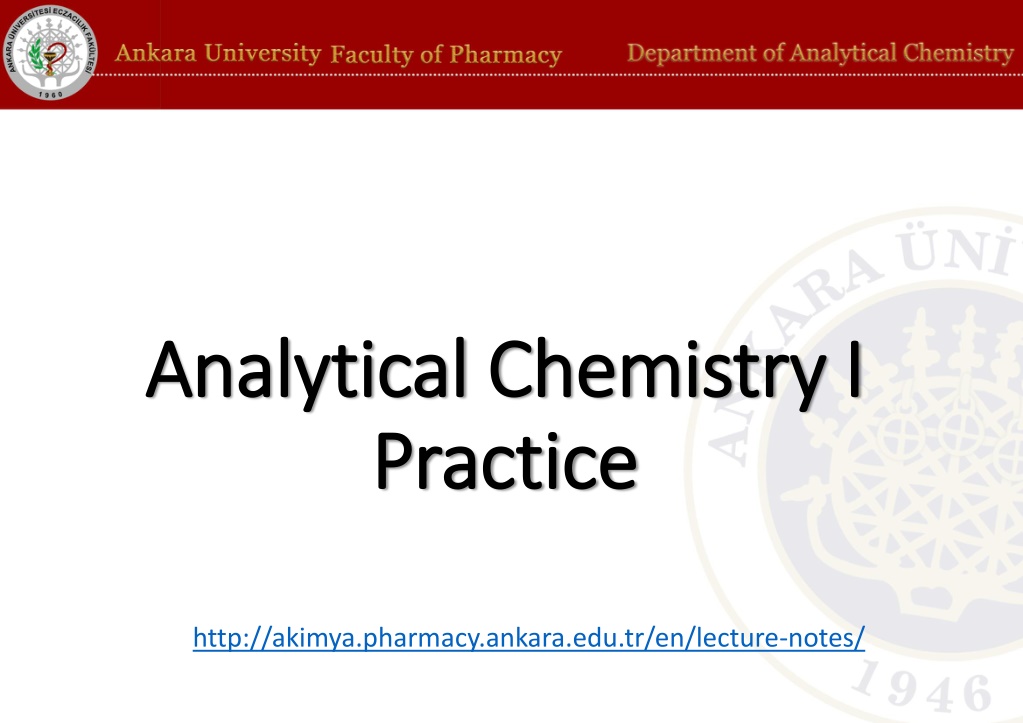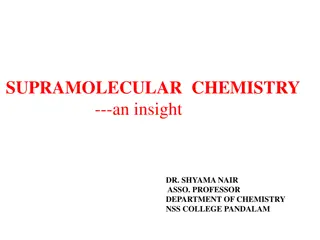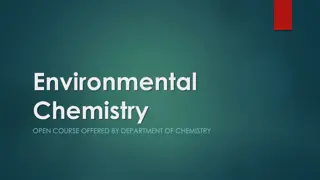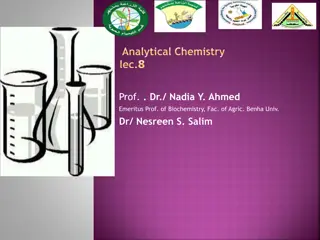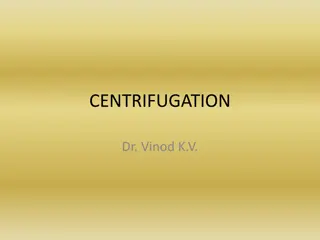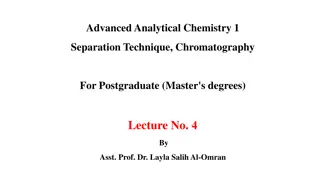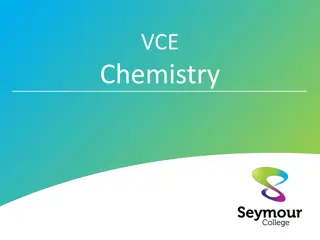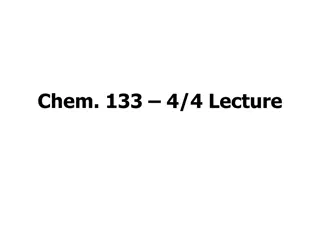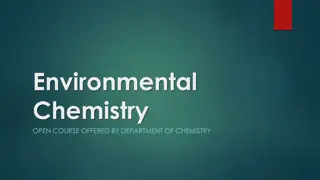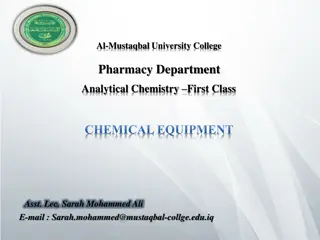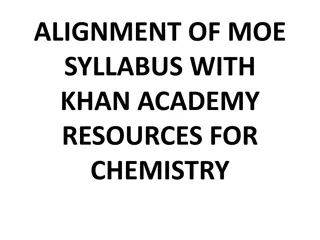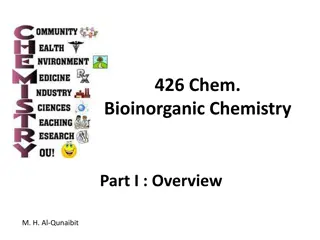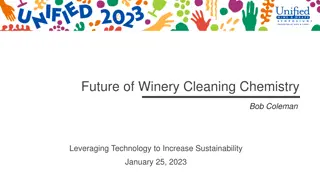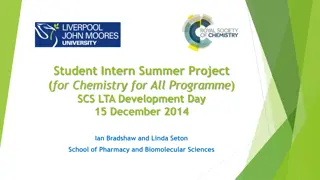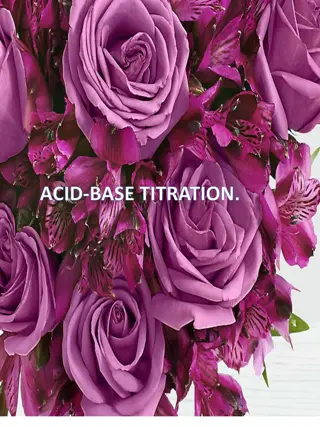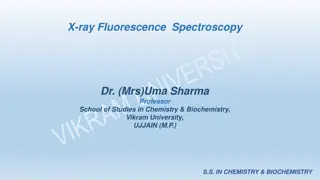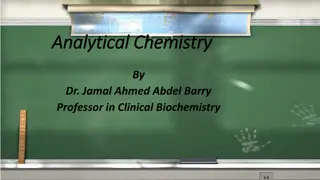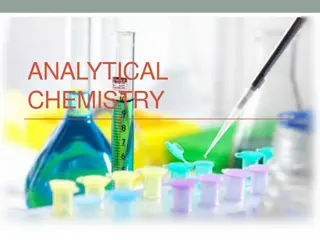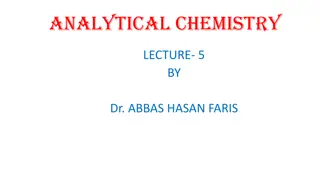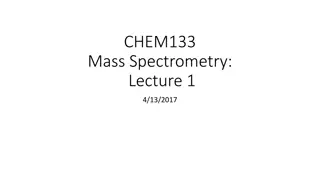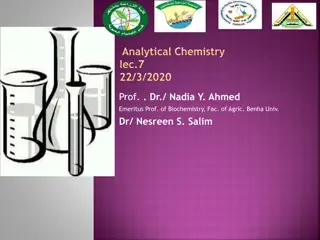Exploring Analytical Chemistry: Course Overview and Objectives
This article provides insights into the field of Analytical Chemistry, outlining a course syllabus, objectives, topics covered, and grading criteria. Analytical Chemistry involves obtaining and processing information about the composition and structure of matter. Analytical chemists play a crucial role in various industries by utilizing their expertise to solve complex problems and ensure safety, quality, and compliance standards are met. The course covers laboratory techniques, qualitative and quantitative analyses, safety protocols, and practical applications in the field.
- Analytical Chemistry
- Laboratory Techniques
- Qualitative Analysis
- Quantitative Analysis
- Chemical Principles
Download Presentation

Please find below an Image/Link to download the presentation.
The content on the website is provided AS IS for your information and personal use only. It may not be sold, licensed, or shared on other websites without obtaining consent from the author. Download presentation by click this link. If you encounter any issues during the download, it is possible that the publisher has removed the file from their server.
E N D
Presentation Transcript
Analytical Analytical Chemistry Practice Practice Chemistry I I http://akimya.pharmacy.ankara.edu.tr/en/lecture-notes/
Course Course objectives objectives This course provides a one semester study of basic analytical laboratory techniques, used in qualitative and quantative analyses. At the end of the semester students should; Use analytical glasswares and associated lab equipments properly, Discover the chemical principles of systematic analysis of cations-anions, Operate basic qualitative and quantitative analytical techniques such as precipitation, filtration, flame tests, color observation etc., Learn and apply laboratory safety rules strictly.
Course Course Topics Topics Week Topics First Meeting, Introduction to Qualitative Analysis, Laboratory Safety Dates 1 September 25 Anions 2 October 2 Group 5 Cations 3 October 9 Group 5 and 4 Cations 4 October 16 Group 3 Cations 5 October 23 Group 2 Cations 6 October 30 Group 2 Cations 7 November 6 Group 1 Cations 8 November 13 Mid-Term exam 9 Introduction to Quantitative Analysis, Preparation of NaOH-HCl 10 November 27 Standardization of NaOH-HCl, Determination of Aspirin Purity 11 December 4 Determination of Calcium carbonate, Determination of Boric acid in antiseptic solution 12 December 11 Determination of phosphoric acid, Preparation of potassium permanganate 13 December 18 Standardization of potassium permanganate and Fe analyses 14 December 25 Final 15
Grading Grading Midterm exam: 30% Lab performance + quizzes: 40% Final exam: 40% Attendances Attendances In case of 20% or more absences you will be graded F Medical excuse is NOT valid for the course since it is a practical course
Analytical Analytical Chemistry Chemistry What is Analytical Chemistry? "Analytical chemistry is the science of obtaining, processing, and communicating information about the composition and structure of matter. In other words, it is the art and science of determining what matter is and how much of it exists. " What Do Analytical Chemist Do? "Analytical chemists use their knowledge of chemistry, instrumentation, computers, and statistics to solve problems in almost all areas of chemistry and for all kinds of industries. For example, their measurements are used to assure the safety and quality of food, pharmaceuticals, and water; to assure compliance with environmental and other regulations; to support the legal process; to help physicians diagnose diseases; and to provide measurements and documentation essential to trade and commerce." American Chemical Society, Analytical Chemistry Definition
Analytical Analytical Chemistry Chemistry Qualitative analytical chemistry identifies substances (determines presence or absence of a substance) while quantitative analytical chemistry measures amount of a particular substance or substances.
Qualitative Qualitative Analysis Analysis In qualitative analysis, an analytical reaction has to be: 1. Observable: Precipation, dissolution of a precipitate, color change, gas evolution or heat exchange. 2. Sensitive: Low amount of samples need to be detected. 3. Specific: Only intended analyte should be reacted. Other substances that possibly exist in the sample should not be reacted.
General General Terms Terms Solution: a homogeneous mixture of two or more substances. Solvent: a substance that is in excess amount comparing other substances and dissolves them in a solution. Solute: a substance dissolved in solvent. Precipitation: formation of a solid in a solution. Separation of a precipitate Filtration: precipiate can be separated from supernatant using a filter paper and a funnel . Decantation: heavy, large-grained particles can be separated from supernatant by transferring liquid part to another tube. Centrifugation: is a process which involves the application of the centripetal force for the sedimentation of heterogeneous mixtures with a centrifuge instrument Filtration Centrifugation Decantation
Best Best conditions conditions for Reagents need to be added slowly and mixture should be mixed well. for high high- -yield yield precipitation precipitation Heating yields better precipitates. Reactant should not be added in excess amount as it may result complex formation and increased solubility. Some substances can form colloids which is dispersion of solid particles in solvent. Colloids do not precipitate because of electrical charge that they carry on their surfaces. They can be precipitated by electrolyte addition. At the end of precipitation, add one drop of reactant to supernatant to check whether precipitation is completed. Solution (left) and colloid (right) Precipitates need to be washed after separation from supernatant: After filtration wash precipitate on the filter paper with distilled water After decantation or centrifugation add some distilled water to test tube, mix the tube and wait for precipitation, discard water.
Labwares Labwares in in Analytical Analytical Chemistry Chemistry I I Practice Practice Pipette Erlenmeyer flask Beaker Tripod support Triangle Crucibles Washing Bottle Bunsen BurnerTest tubes
Labwares Labwares in in Analytical Analytical Chemistry Chemistry I I Practice Practice Platinum wire Spatula Centrifuge Centrifuge tube Forcept Watch glass WireGauze Wooden tongs RubberBulb
Tips Tips Transferring precipitate: use spatula Mixing solution: use stirring rod Heating solution: use water bath for safe and homogeneous heating Solvent evaporation: apply flame to directly cruicible containing solution and turn the flame off when very little liquid left in the cruicible. Distilled water: obtained by distillation of water. Always use distilled water in your experiments. Cleaning glasswares: Wash with tap water for a few times and then use a little amount distilled water to final rinse.
Rules Rules Be punctual! Never come late. Lab coats, googles and gloves must be worn at all times whilst working in the lab. Cellphone usage is forbidden in the lab. Do not shout in the laboratory. Eating and drinking is forbidden in the laboratory (including chewing gum). If you have an urgent issue, you may go outside with the permission of the teaching assistants (T.A.) Work slowly and carefully. Don t try to rush things in the laboratory. Absolutely no fooling around or horse play will be tolerated in the laboratory Shoes must be worn in the laboratory at all times. These must be covered-top. NO sandals or spaghetti-strap high-heels are permitted.
Rules Rules Do not mouth-pipet; use a rubber bulb. The wearing of shorts is forbidden in all Analytical Chemistry labs In case of chemical burns, Immediately run copious amounts of cool water to the affected area. Never apply an acid (base) to neutralize any base (acid) you may have gotten on you. Always wash with large amounts of cold water. Never point the top of a test tube, beaker, flask etc., at yourself or anyone else. Loose long hair can be a danger as open flame is used in Analytical Chemistry Lab. Please try to keep your hair bound in some manner. For wastes, ask your T.A. for disposal (container or sink) Clean up all spills immediately. After using the chemicals, close their caps immediately.
